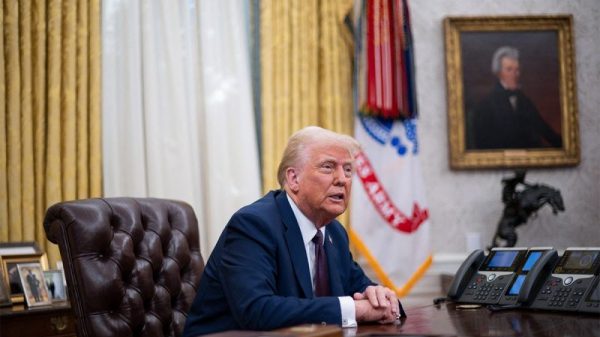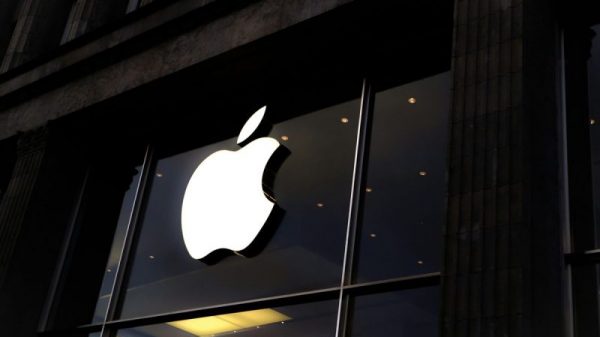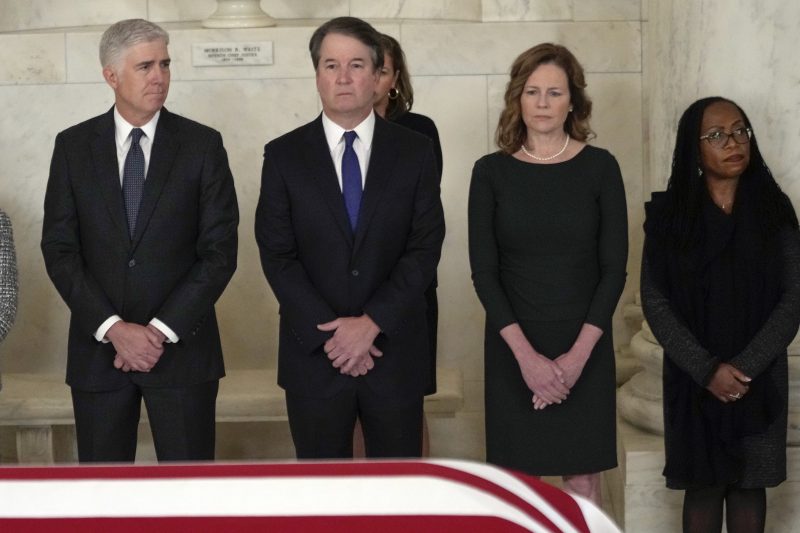In 2017, U.S. Circuit Judge William H. Pryor Jr. was one of three finalists for the first Supreme Court vacancy Donald Trump got to fill.
On Monday, Pryor delivered a stinging rebuke of Trump’s former chief of staff in a key Jan. 6 case. He might also have undermined Trump’s claims to presidential immunity in Trump’s federal Jan. 6 case.
The ruling came as both the Trump immunity claim and another crucial Jan. 6-related issue could be headed to a conservative-leaning Supreme Court where Trump nominees fill three of nine slots.
And it served as a timely reminder of how even many Republican- and Trump-nominated judges have taken a dim view of Trump and his allies’ efforts to overturn the 2020 election.
The 11th Circuit Court of Appeals on Monday denied former Trump White House chief of staff Mark Meadows’s effort to get his Fulton County, Ga., criminal case “removed” to federal court. Meadows argued that he had been acting in his official capacity during the course of events relevant to the indictment, and thus was entitled to a change of venue.
The three-judge panel unanimously rejected Meadows’s claim. Just as notable as the judgment was the author of the ruling — Pryor, a judge so conservative that his Supreme Court prospects appear to have been harmed by his hostile words about Roe v. Wade and his past support for states being able to outlaw gay sex — and what he said about Meadows’s actions.
Pryor wrote that Meadows’s effort failed not just because former officials can’t get cases removed to federal court, but also because Meadows’s political actions wouldn’t have qualified his case for removal anyway.
In the course of making that case, Pryor repeatedly alluded to the concept of Meadows seeking to interfere in the election results. Sometimes it was discussed as an allegation. But at other points that careful caveat wasn’t there:
He at one point cited “federal executive interference with state election procedures.”At another point, he described Meadows’s conduct in Cobb County, Ga., as “attempting to infiltrate the nonpublic signature-match audit.”Pryor also concluded that Meadows’s official “role does not include altering valid election results in favor of a particular candidate.”
You could read those sections as describing the allegations against Meadows rather than directly accusing him of something. But referring to election “interference” and Meadows’s attempt to “infiltrate” (a pretty loaded word) Cobb County’s process seems like a choice.
Perhaps most significant, the ruling in its own words describes Georgia’s election results as “valid” — an adjective that wouldn’t seem to be strictly necessary in this context but is something Trump to this day wrongly disputes.
Also potentially significant in the ruling is what it might say about Trump’s claims to presidential immunity in his federal election-subversion case.
Trump’s lawyers have signaled that they will argue Trump has immunity because his actions fall under the Constitution’s “take care” clause, which states that a president’s duty is to “take care that the laws be faithfully executed.”
But Pryor wrote that Meadows presented “no legal authority for the proposition that the President’s power extends to ‘assess[ing] the conduct of state officials.’”
Then he gets to the line about “interference.”
“We are aware of no authority suggesting that the Take Care Clause empowers federal executive interference with state election procedures based solely on the federal executive’s own initiative,” Pryor wrote, “and not in relation to another branch’s constitutionally-authorized act.”
While not binding on the Supreme Court, that reading from a conservative judge might signal that Trump shouldn’t try to fall back on such an argument for immunity.
The Meadows ruling is hardly the first example of a Republican-nominated judge ruling against Trump’s side in a case with some proximity to the matters ahead.
With judges ruling nearly unanimously against Trump’s and his allies’ lawsuits after the 2020 election, The Washington Post conducted an analysis finding that, by mid-December 2020, 38 out of 86 judges who had rejected them were Republican-nominated — about 44 percent. Among them:
Trump-nominated U.S. Circuit Court Judge Stephanos Bibas said in a Pennsylvania case, “Charges require specific allegations and then proof. We have neither here.”Trump-nominated U.S. District Judge Steven D. Grimberg wrote that Trump’s attempt to block certification of the results in Georgia “would breed confusion and potentially disenfranchisement that I find has no basis in fact or in law.”Trump-nominated U.S. District Judge Brett H. Ludwig in a case in Wisconsin rejected Trump’s effort while citing “issues he plainly could have raised before the vote occurred.”
Republican-nominated judges have rejected GOP efforts to downplay the events of Jan. 6 as well as undermine the House Jan. 6 select committee. They’ve signaled that Trump’s Jan. 6 speech might have been intended to urge people to storm the Capitol. One called Trump a “charlatan” who doesn’t care about democracy, in the context of a Jan. 6 case.
The Supreme Court rejected an extreme Texas lawsuit aiming to invalidate the election results in other states, and it previously rejected a Trump immunity argument in an investigation by the Manhattan district attorney.
Besides its potential review of Trump’s latest immunity claim, the Supreme Court will soon consider the validity of a charge used against hundreds of Jan. 6 defendants, including Trump in his indictment: obstruction of an official proceeding.
But while a Trump-nominated district judge ruled that the charge couldn’t be used in the case at issue, and some fellow Trump-nominated judges have expressed skepticism about it, the use of the charge has been upheld by other Trump and Republican nominees.
This Supreme Court has certainly shown it can go in its own direction on matters of huge importance, like overturning Roe v. Wade. But game-changing rulings severely hampering Jan. 6 prosecutions and bolstering Trump’s legal arguments would be at odds with the way most Republican- and Trump-appointed judges have handled these matters.






























